CINCINNATI — Toncia Chavez meticulously stacks vegetables atop a display stand in her store, ETC Produce and Provisions, at Findlay Market.
What You Need To Know
- Small businesses across the country faces supply chain issues related to limited availability of packaging materials
- Many food service businesses, such as those at Findlay Market in Cincinnati, are paying two or three times what they typically spend for things, like glass jars and plastic containers
- Beyond price, the limited availability of packaging is causing businesses to make difficult choices about everything from menu offerings to branding
- Vendors at Findlay Market are working together to share resources when able
There are large carrots, beets of a deep-purple color, small heads of lettuce and an assortment of peppers. They usually carry the “full stoplight” of bell peppers — red, yellow and green — but currently only have the yellow variety, Chavez said.
The stall at the Over-the-Rhine market is small, only about 600 square feet in size. But there’s plenty of room for most of the locally grown produce and a bevy of regional artisanal products, items ranging from apple butter to brownies to a small batch soy sauce.
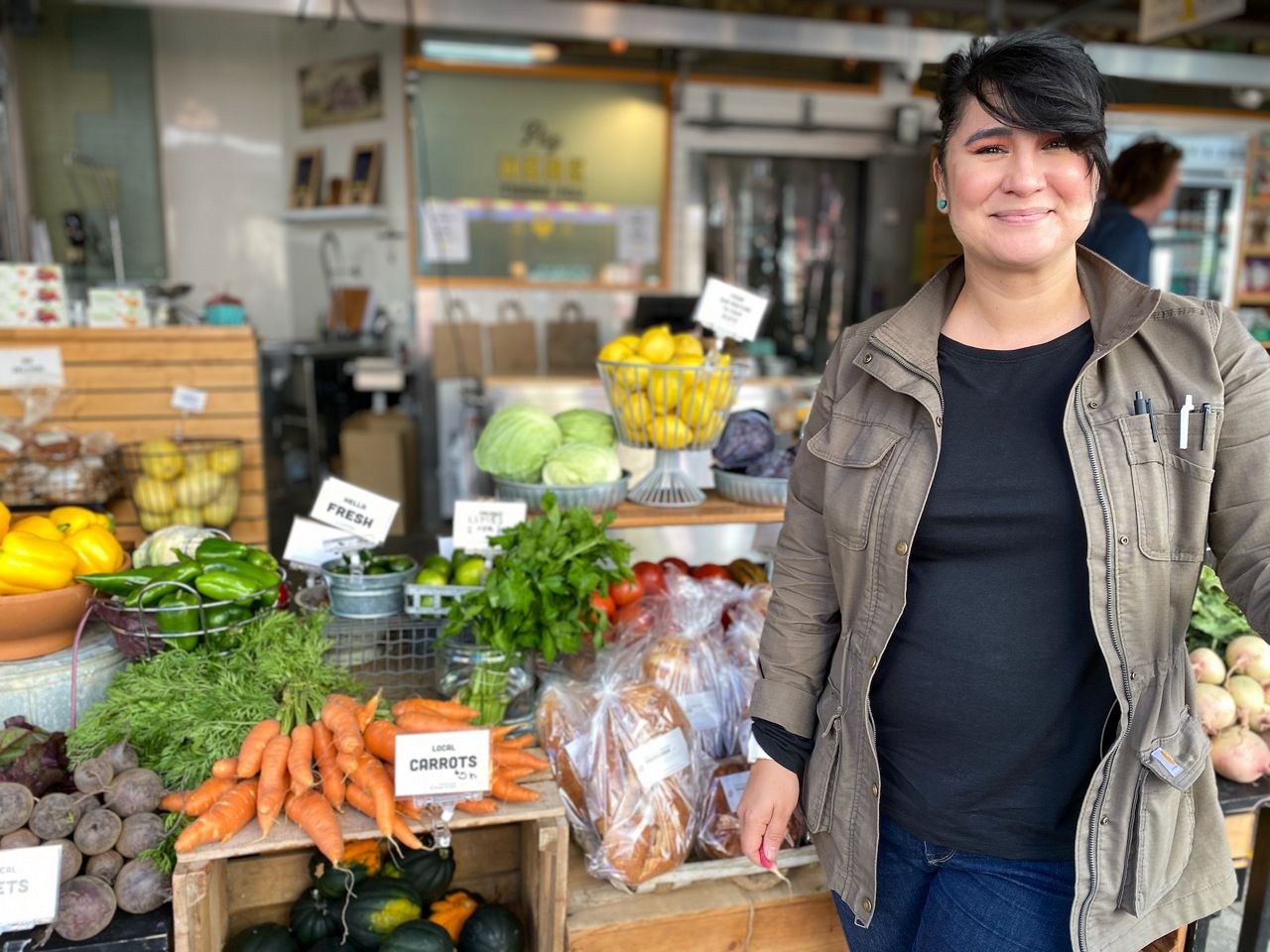
Like Chavez, vendors and stores across the country are experiencing similar supply chain issues related to the COVID-19 pandemic.
One of the items ETC had trouble tracking down in recent weeks is candy apples. Her usual vendor supplied Chavez with other carmel products — handmade caramel candies and a caramel dip. But the apples took a lot longer to arrive than they normally do.
Getting apples isn’t the issue; they’re in season and growing all over the region. The problem is the packaging, in this case a clear container with individual slots for four apples; there’s hole over the top of each slot.
"I put my order in on Monday. On Wednesday, she sent me a text message saying, 'Hey, I'm still waiting on packaging. I ordered it last week and they're still not here.’ She texts me again on Friday — still no packaging, same thing on Monday,” Chavez recalled.
The Indiana-based vendor didn't get the needed packaging until the following Wednesday — two weeks after Chavez placed her order.
"So, those apples are now two weeks old and I can't use them. That wouldn't be fair to me. She had to make fresh apples," she said. “She had to eat that cost and I didn’t have a product to sell.”
While the cost of many foods — especially beef, pork and poultry — has increased, so has the price of materials needed to package them for sale or shipment.
The companies that manufacture things, like takeout boxes and plastic storage cases, have to pay more for soaring costs for materials. They’re also dealing with issues related to shipping and nationwide labor challenges, both of which are slowing down the ability to deliver products.
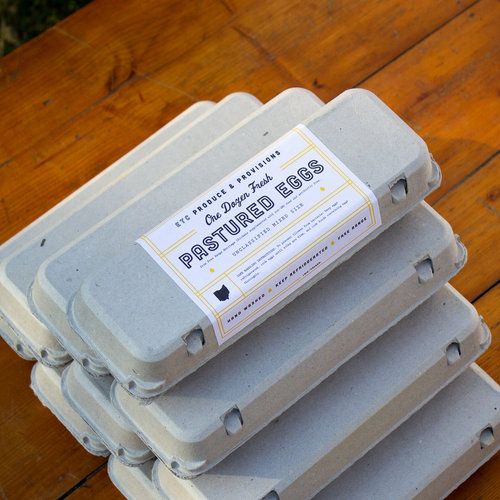
Getting any packaging — plastic wrappings, egg cartons, plastic containers, glass jars with lids, etc. — have "tripled in price" within the last month, Chavez said.
Chavez didn’t want to delve too deep into specific figures, but Chavez said ETC is spending “a lot” more on packaging right now than years past. For example, one box of 500 deli containers used to cost about $67. That same box costs about $120 right now.
They’ll last for a week or two.
"Every time I go to order plastic deli (containers), it seems like there may be an issue. Sometimes they won’t have the right size, or sometimes they’ll have the size I’m looking for, but they won’t have the lids. The lids haven’t been available for three weeks,” she said. “I have no idea what we're gonna do when we run out of lids.”
Limited availability and increased demand have caused supply prices to skyrocket as well.
While the issue is affecting retailers of all sizes, it’s particularly challenging for ETC and the 50 or so other businesses that call Findlay Market home.
“We're buying these things online and as small business owners, we don't get to buy 50,000 of something. We're buying like, 100 at a time. So not only is our price going up, but the scarcity of the product is getting ridiculous,” Chavez said.
Chavez said she knows everyone is feeling a financial pinch right now. She asked shoppers to try and understand that any potential price increases they’re experiencing right now isn’t an attempt to “get rich.”
Profit margins at ETC are "slim," Chavez said. That money goes to rent, payroll, office fees and other operations costs, such as paying for their credit machine.
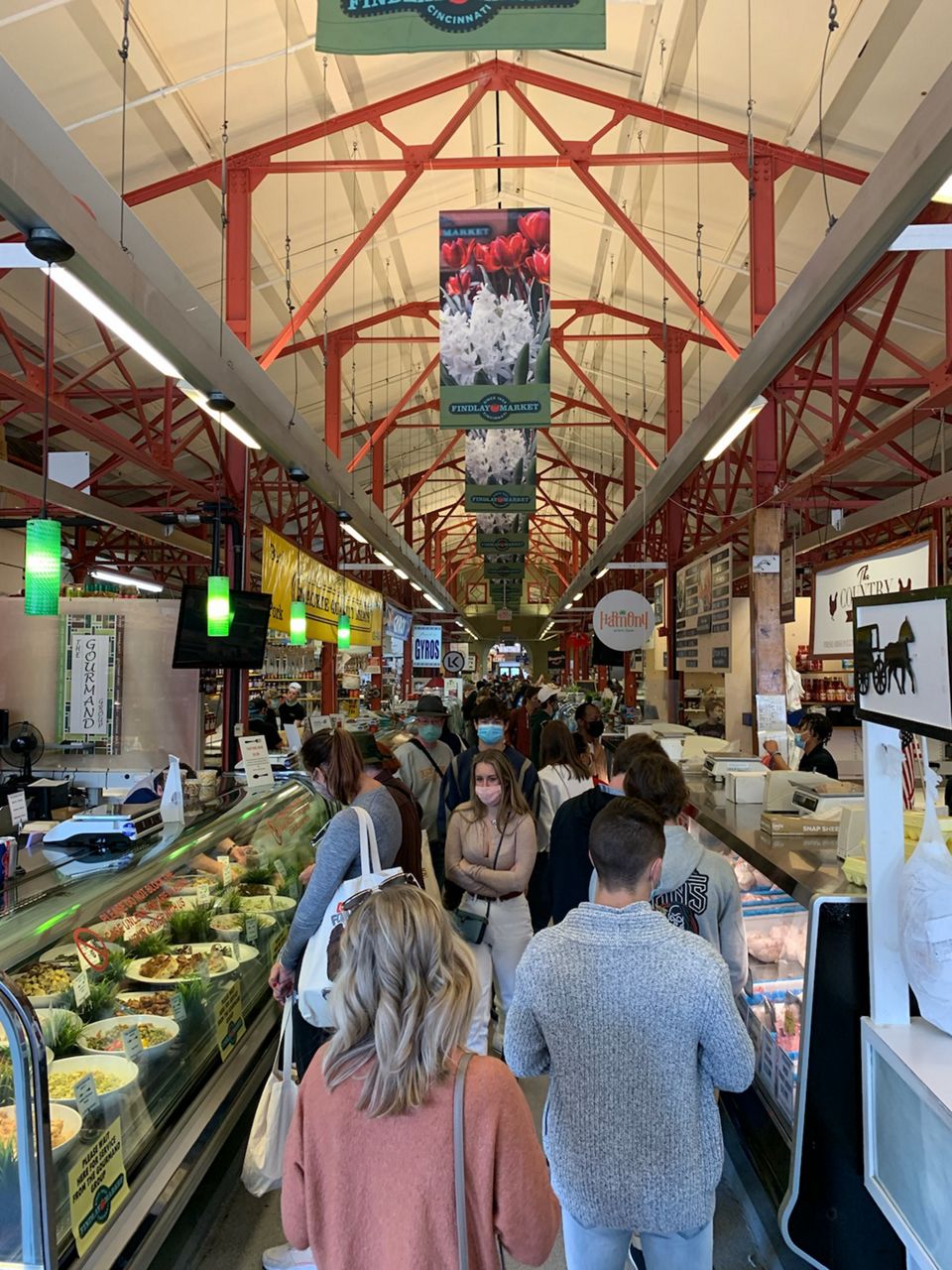
“We ask that customers please have grace and understand the situation,” she added. "If you are seeing prices go up at a small business, it's not because we're trying to buy a Mercedes. We're just trying to make sure our (employees) are getting a paycheck next week."
Chavez said food isn’t the issue, especially for a business like hers. She grows some of the products she sells on her family farm, a 68-acre plot of land in Felicity, Ohio, about a 40-minute drive from Findlay Market.
They grow microgreens year-round and and pawpaws in fall. They have zucchini and various lettuce mixes during the summer months. They also have more than 400 cage-free chickens that lay eggs.
She lives on the farm with her husband, Estevan, and their two children, a 3-year-old and a newborn. Estevan looks after the farm while Chavez handles the day-to-day at the store.
“He’s the best farmer I have,” Chavez said of her husband with a wry smile. Even if playfully said, that’s high praise from Chavez. ETC relies on a host of other farmers and artisans across Ohio, Kentucky and Indiana to fill out their catalog of items.
They also get some products from Georgia and Tennessee. They get their out-of-season organic items from Florida and California. But most of the items are farm fresh, Chavez said, meaning they come from no more than about two hours away. ETC grows and sources more than 90% of the foods and products they sell from local producers.
Chavez said relying on their own products helped stave off many of the supply issues experienced by other businesses during the pandemic.
ETC’s orders went through the roof — from about 45 a week to more than 600 at the peak of the pandemic. Kids in tow, the Chavezes made all their deliveries those few weeks.
They increased their staff from four to 14 to help them keep up with demand. They picked up individuals who had been laid off — a tattoo artist, a few restaurant workers. One of the first was a signmaker. ETC paid them an hourly wage plus a bag for food to take home every week.
Still, about 30% of their business is delivery, all of which requires additional packaging.
"We are very lucky to have a wide variety of amazing local farmers, artisans. But they’re the ones feeling the crunch. It’s really about the packaging because most of everything they're making or growing by themselves," she said.
Two stalls down from ETC, Makers Bakers Co., an artisanal bakery, hasn’t been able to find a specific type of container to serve their product in several weeks. They made the decision to switch from their established translucent package to one that’s more opaque.
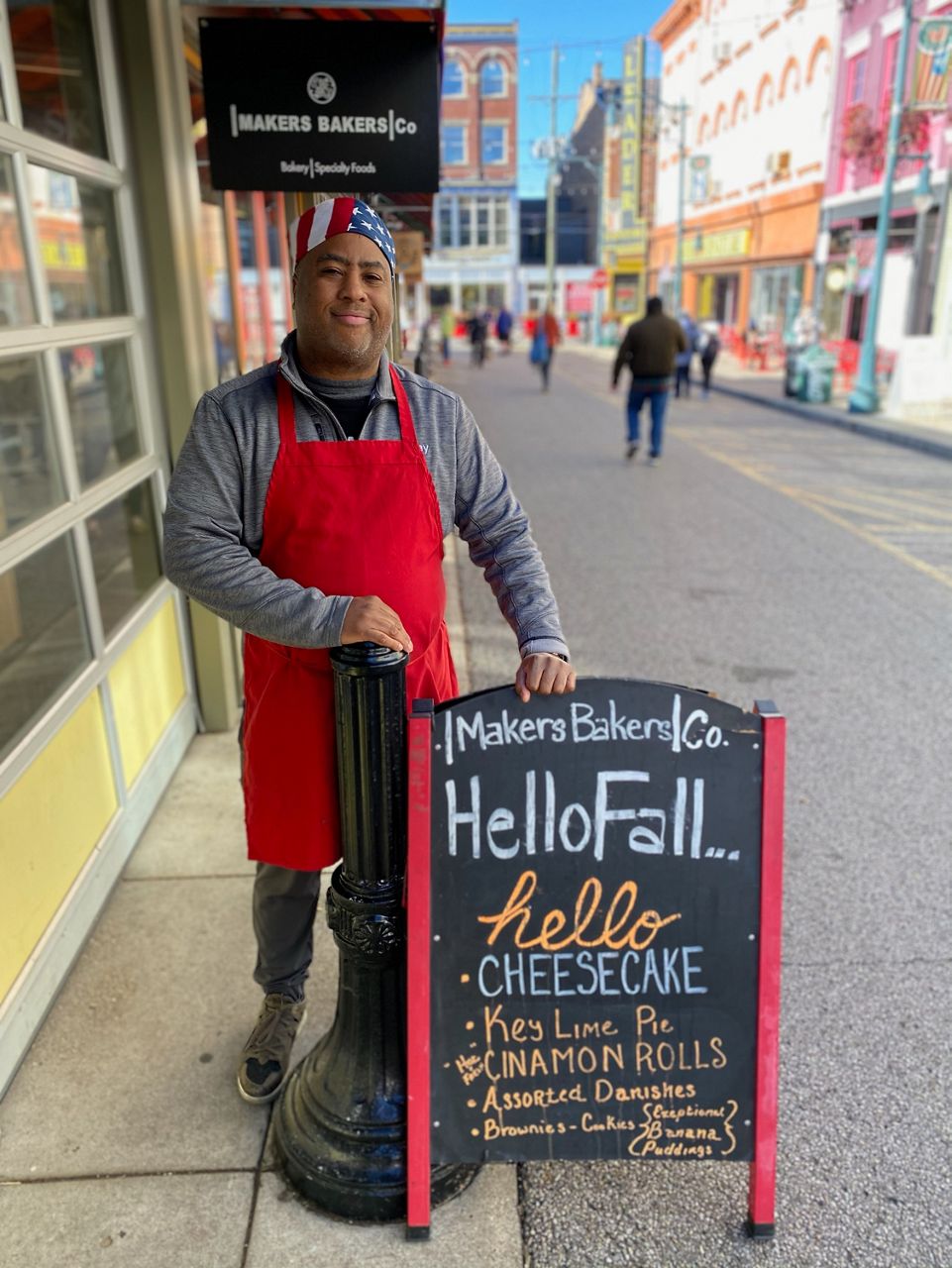
Makers Bakers specializes in artisan cheesecakes, custom cakes and cookies. One of their signature items is a cinnamon roll. They’ve sold products at Findlay Market for several years, but just moved into a booth a little more than a year ago.
“It’s nothing special. We just can’t get it right now,” said owner Kevin Foston. He added that while his customers don’t seem to mind, it can be stressful as he’s trying to establish a new brand.
“We’re trying to invest in branding and packaging to really establish a relationship with our customer base and now we find ourselves injecting new packaging to the mix just to ensure we can get the size and quantity we need to do business,” Foston said.
Foston started hearing rumblings of supply chain issues earlier this spring after a tanker ship turned sideways and blocked the Suez Canal, a vital trade route. The channel links manufacturers and suppliers of Asia to the major consumer markets throughout the world.
He said he’s never seen this type of markup or inflation before. Item prices can sometimes change multiples times a week.
“It’s not just the tanker. There’ve been several forest fires that led to devastating losses in fruit production. It's been very hard for us to find blueberries. Just recently, we cannot get heavy whipping cream and cream cheese and cheesecake, which is one of our top sellers,” he said.
Foston said he almost had to laugh at how “crazy” the situation has become.
He said as a newer business, having a strong performance during a big holiday season is going to be vital. Not just for earnings, but for establishing a relationship with customers. He said he’s already had big orders for fruit cobblers and apple pies.
“There’s definitely some panic and stress wondering how we are going to make sure we can take care of our customers,” he said. “We want to make sure that we can satisfy our customers with the highest quality possible and having that shaky availability is scary.”
One reason Findlay Market has been able to survive the pandemic is the customers; a mixture of regular grocery shoppers and tourists who see the market as a year-round destination. Another reason is the vendors themselves, who’ve pulled together as a community.
Foston said the respective business owners also have conversations about their supply needs and look for ways to share resources when and where possible. Since they’re all trying to find supplies in the smallest quantity and cheapest cost possible, they’ll work together and share.
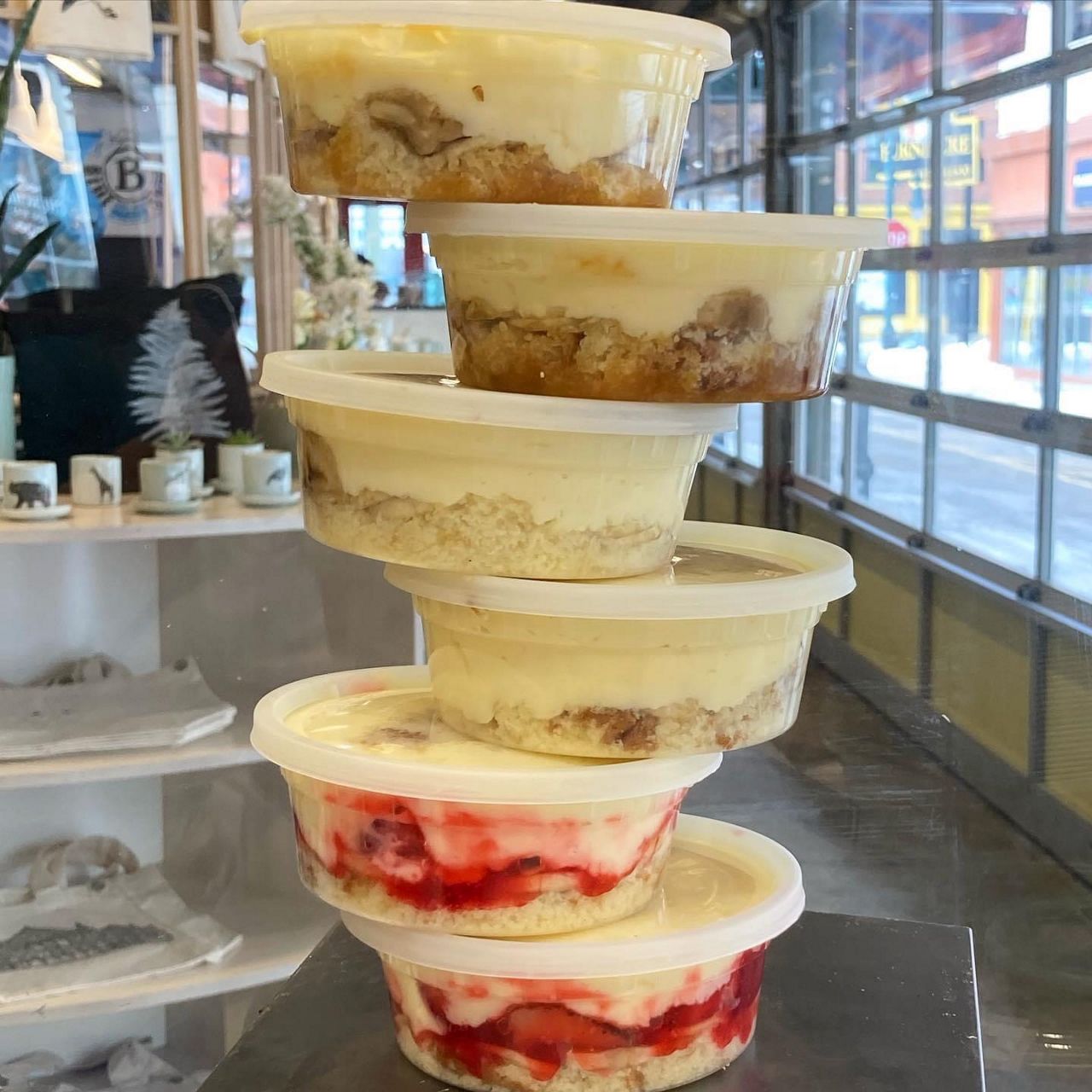
“It's like, 'Hey, were you able to find this, this week? I found this. I found this.’ Instead of buying one or two of something, I'm buying three -- one for the store, one for the farm and one for the company down the way,” Chavez said. “It's awesome that we have fellow friends, fellow business owners who are kind of all in the same situation.”
She credits the Corporation for Findlay Market, which operates the market, with finding ways to support the local businesses throughout the economic hardships caused by the pandemic.
John Bird, director of market management and operations at Findlay Market, said it’s a challenge right now for some merchants.
“You can go to the same business every Wednesday for a month that does prepared food and you're probably going to receive your item in a different to-go container almost every single time almost," he said. "They're having to adjust as to what's available."
One way the market is doing that is by providing overflow storage its merchants can use on a “loaner” basis, Bird said. That includes the use of a refrigerated van. The goal is to allow them to purchase more in bulk and cut down on some of their mounting overhead costs.
"It's our goal and our mission to help and support small entrepreneurs and allow businesses to start, grow and scale here at the market,” he said.
Bird described the market as an "ecosystem of collaboration.” He added that they’re looking for additional opportunities to help vendors work together to cut down on their respective overhead costs.
"It's amazing to see the way different merchants support and work together with each other. If it's just simply sharing and helping each other out with some storage spaces, bouncing ideas off of each other to sort of talk shop,” he said.



